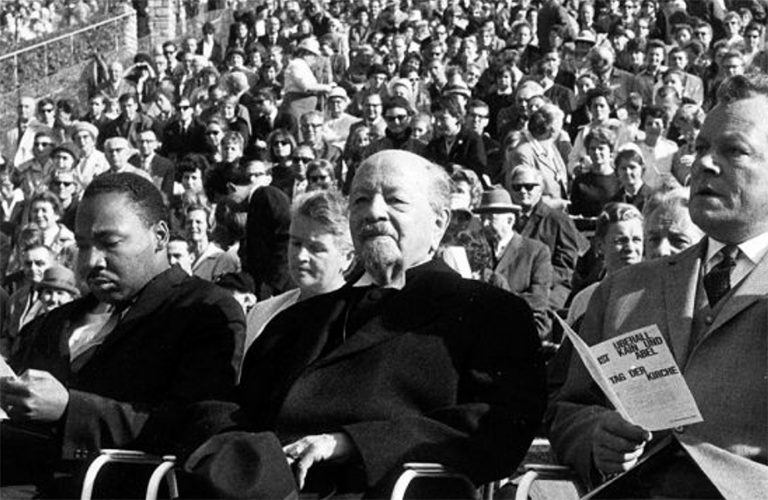German Classes Study MLK’s Visit to a Divided Berlin
February 20, 2019 — The Georgetown College Department of German is participating in Georgetown’s MLK Initiative with a department-wide celebration of an often-overlooked trip Dr. Martin Luther King Jr. took to Berlin on September 13, 1964.
MLK IN BERLIN
Already an internationally famous figure by 1964, King visited West Berlin on the invite of Social Democratic leader Willy Brandt, appearing at a memorial service for John F. Kennedy and at a rally before a crowd of 20,000. He spoke out against the newly constructed Berlin Wall, calling it “a symbol of the divisions of mankind on the face of the Earth.”
The same day King visited, a man named Michael Meyer attempted an unauthorized escape from East Germany. He made it to the Western side of the city but was shot by East German guards, suffering serious injury but surviving. After his speech, King requested to visit the spot where Meyer was shot.
King also received an invitation from East German pastor Heinrich Grüber to deliver an address at a church in East Berlin. His State Department detail, concerned that a trip to Soviet territory would spark an international incident, withheld his passport. King crossed anyway, with border agents accepting an American Express card as identification.
In East Berlin for just a few hours that night, King gave the same speech in two separate venues, as church organizers were concerned about the possibility of a state crackdown if one event drew too big a crowd.
“We are all God’s children, and no manmade barrier can obliterate that fact,” King said.
CLASS PRESENTATIONS
Each German class that meets this week is spending a minimum of 15 to 20 minutes discussing King’s visit. Professors have access to a presentation featuring details from King’s speeches, as well as a trove of additional articles and multimedia materials prepared by Professor Astrid Weigert and Ph.D. candidate Andrea Bryant.
Bryant, whose research focuses on diverse perspectives in German studies pedagogy, enjoyed bringing a rich variety of materials on King’s visit to Georgetown.
“You could probably do an entire semester on this visit,” Bryant said. “There’s art and literature on this in German, it’s been performed on stage.”
“Everyone teaches about the Berlin Wall. This isn’t in it.” Weigert said.
Professors will use their own discretion on which materials to utilize based on the level of course they’re teaching, and the presentations all offer additional resources for students looking to learn more. Bryant expects it to be a valuable learning opportunity for students at all levels, especially given that the visit has received little attention in German studies circles before this year.
“We have some documents in English and some in German, so depending on the level and instructor, there are options on how to teach it,” Weigert said. “But the main thing is that there’s a commitment from the entire department. This is our contribution.”
A UNIQUE CONTRIBUTION
Weigert is excited that the Department of German has found a unique angle to participate in Georgetown’s MLK Initiative, a cross-campus celebration of the life and legacy of Dr. Martin Luther King Jr.
“Somewhere in the back of my mind, I remembered reading somewhere that Dr. King had spent time in Germany,” Weigert said. “I looked it up, and it turned out he had indeed been in both East and West Berlin— shortly after the wall had been built. So I thought maybe we could do a “teach-in” about this visit. This first time around, it’s a a bit of an experiment, but we plan to refine the presentation and ideally repeat this project every February.”
Events thus far have included a nonviolent resistance campaign workshop, a screening of the film “Rebirth of a Nation,” and the annual Let Freedom Ring concert at the John F. Kennedy Center for the Performing Arts.
In addition to the German teach-in, the remainder of February will feature a performance based event sponsored by the Center for Social Justice, as well as panel discussions on health in the Black community, race and higher education, and the changing nature of Black D.C. Visit the MLK Initiative website for more information.
- Tagged
- German
- MLK Initiative
